#oðinn
Text
Y'all, Thor is so great. If you need just a solid buddy, he's your guy. We just shot the shit for a while tonight, and it was just lovely. He really gives a shit about us, about humanity. (I mean, protecting us is kinda his Thing™️, after all.) Having spent a little more time with him, I see why he and Loki share so many stories with one another. Neither of them is dumb or weak, but their respective strength and cunning pair really nicely when you wanna get up to some shit. Even if your partner in crime has a slightly different agenda than your own. Add Odin into the mix and you've truly got a sitcom on your hands. Earlier this week I was talking with Thor and Loki together, and Odin just showed up like, "Who the fuck was gonna tell me y'all were hanging out?" What a kooky fucking bunch. I love these dorks. 10/10, would hang out again. ❤️
#odin#thor#loki#loki deity#norse loki#norse thor#norse odin#þor#oðinn#lokean#heathen#heathenry#upg#deity relationships#10/10#we have fun here#we experience love here
85 notes
·
View notes
Text
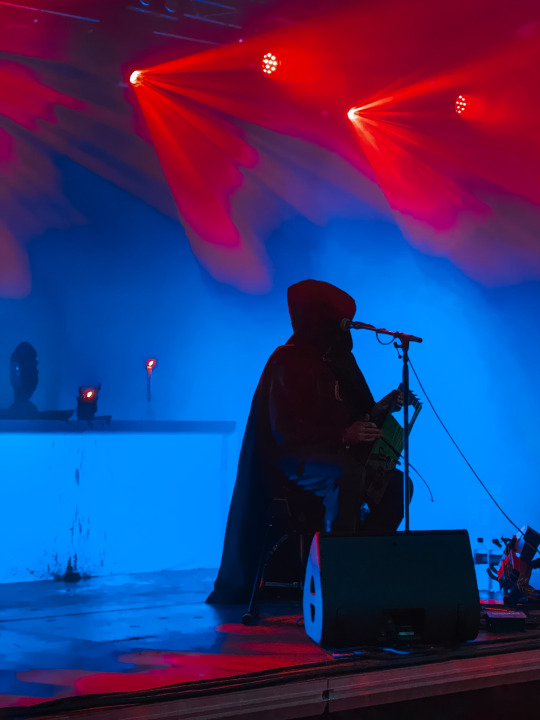
© Priestess of the North-West.
@forndom @castlefest yesterday. Stunning and glorious.
Thank you for your heartfelt gift at the end.
5 notes
·
View notes
Text
11 notes
·
View notes
Text
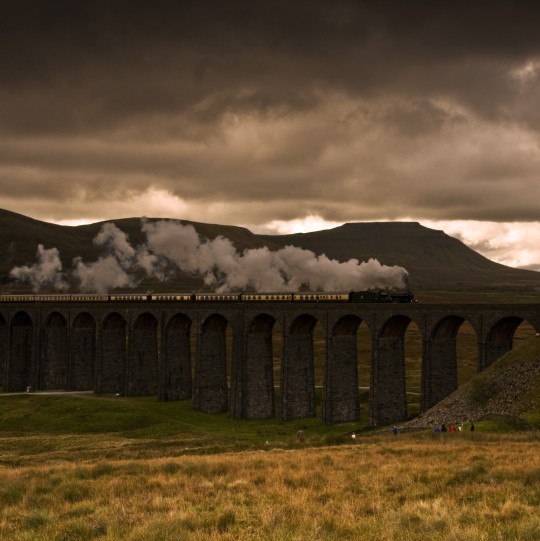
Gangleri - restless, nostalgic, melancholy
Al Jolson - Brother, Can You Spare A Dime?
Nancy Sinatra - Bang Bang (My Baby Shot Me Down)
Eliza Gilkyson - Is It Like Today
Charley Crockett - Welcome to Hard Times
Pete Seeger - Pretty Boy Floyd
Pharis & Jason Romero - A Wanderer I'll Stay
Mischief Brew - Old Tyme Mem'ry
Colter Wall - The Devil Wears A Suit and Tie
Jesse Stewart - Marauder
[image credit]
7 notes
·
View notes
Text
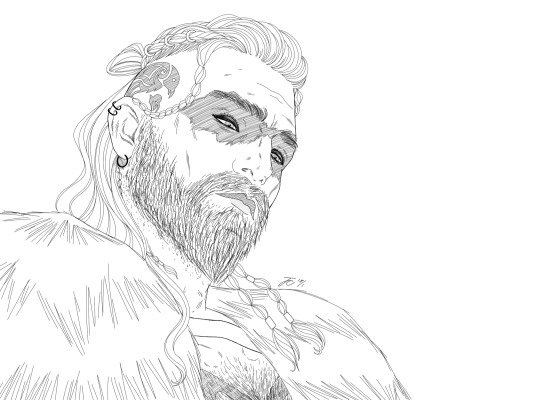

Who shall the bane of Baldr become,
And steal the life from Oðinn's son?
Who shall vengeance win for the evil work,
Or bring to the flames the slayer of Baldr?
#eivor wolfkissed#eivor varinsdóttir#eivor varinsson#ac valhalla#baldr#the poetic edda#baldr's draumar#um hi i'm insane ^_^#someone take the poetic and prose eddas away from me.#i like the black and white sketches better than the finished colour versions which are on patreon. sowwy#BTW it's one of Oðinn's other sons that gets tricked into killing Baldr in these texts. but I'm the game it's Surtr#also one of his Other sons kills the son that killed Baldr. so he's essentially down two sons#Griffin McElroy voice i abandoned my boy#as always. tagging both eivor's patronyms with transgender intent fashies fuck off lol
26 notes
·
View notes
Text
anyway on this blog we acknowledge the fact that oðinn is a bit of a dick (he was the real villain all along).
#we also acknowledge the indoctrination of asgardian elitism#that is (you guessed it) perpetuated by oðinn#and learning the hard way that sometimes the people that you idolize are just... massive douchebags
3 notes
·
View notes
Text
never not thinking about the wild hunt and all its hyperspecific regional and cultural variants. like What Was Going On There. really
#spirits and black goats in england?? unseelie court in scotland??? Fucking Clowns in France???#woden/wotan/oðinn often leads the hunt in places with germanic basis such as scandinavia germany netherlands and england#guernsey has sea witches.....#there's so many kings and heroes and random figures like francis drake (!?) who have been subsumed into the myth too
10 notes
·
View notes
Text
i went to a talk yesterday and they were talking about oðinn and valhalla came up in passing and this woman asked a question about it. but as she was asking it she was like "now this oðinn. I guess he thought he was a god but there's only one god and it's not him, I want to make that clear, so—"
it was SO funny and so out of the blue how determined she was to make sure we knew that she Did Not Believe In Oðinn (nobody had suggested otherwise) before she would ask any questions about him. i didn't think we got That flavour of Christians around here
#she also thought we used to be able to talk to birds in the era of the old testament#but that we had lost the bird language. language of the birds#i told her about weird bird angels in medieval irish voyage tales to distract her
21 notes
·
View notes
Note
I have this kind of idea in my head that Odinn was worshipped more by the wealthy/warrior class whereas Thorr was the guy for the working class people of the viking age. I think I remember reading something about that, perhaps even on your blog? But I can't find much about it anymore. Is that true and how do we know it?
The main piece of evidence for this is the poem Hárbarðsljóð, in which the disguised Óðinn taunts Þórr like this:
Óðinn á jarla,
þá er í val falla,
en Þórr á þrælakyn.
'Óðinn has the jarls
who fall in battle,
but Þórr has the kindred of slaves.'
Interpreting this, especially in light of other evidence, is not easy. Clearly, the jarlar that Óðinn is talking about are the einherjar in Valhöll. We do get some pieces of lore about Þórr also having a place where people go in the afterlife, but not in detail, and as I'll discuss below, all of the most famous Þórr-worshipers are not slaves (though, let's keep in mind our sources for the religious beliefs of slaves is not good). Hárbarðr's taunt might be alluding to something like Óðinn being worshiped by a very specific elite, while Þórr was worshiped by people at all strata of society, including but not limited to slaves.
The idea is mentioned in recent literature pretty frequently, but some key articles are "How High Was the High One? The Roles of Oðinn and Þórr in Pre-Christian Icelandic Society" by Terry Gunnell (in the book Theorizing Old Norse Myth), "Pantheon? What Pantheon?" also by Gunnell, and to a certain extent also "How Uniform was Old Norse Religion?" by Stefan Brink (which is not about class, but about geography, which is a much stronger indicator). In "Cunning Intelligence in Norse Myth: Loki, Óðinn, and the Limits of Sovereignty," Kevin Wanner makes use of the absence of royalty in Iceland, and just within Iceland Þórr. Both of the Gunnell pieces are highly synthetic of other peoples' work, revisiting ideas that were already decades old in light of new evidence, and are full of citations to other resources you might find useful.
As an example of where it starts to break down, part of the evidence for this is the way that Þórr was widely recognized in Iceland (which we know about though place-names, personal names, and saga descriptions of people and their religious expression) while Óðinn seems not to have been (based on the same types of evidence; the most famous Icelander dedicated to Óðinn was Egill Skallagrímsson, who was renowned as a poet, and whose family did serve Norwegian royalty at one time).
But within Iceland, the people we're drawing evidence from were in many cases wealthy land-owners. People like Þórólfr Mostrarskegg were marginalized from formal power in Norway, but did become part of Iceland's less centralized, land-owning aristocracy.
We might even be able to say that, by comparing the highest classes of Iceland and Norway, worship of Þórr and worship of Óðinn respectively pertain to two different ideologies of wielding and maintaining power (Olof Sundqvist has written quite a lot about "religious strategies for rulership"). Though, we can also bring it back to the original question by framing Þórr worship in this context as "We are commoners who happen to have more wealth and power than other commoners, so support us, because we support you, because we are essentially the same" where Óðinn-worship might have been something more like "we rule because we are categorically above commoners."
We can find examples pertaining to worship of Freyr as well. So while there's a class dimension here, Iceland and Norway had different class configurations due to the absence of royalty in Iceland, and just within Iceland Þórr was worshiped by people of the highest class attainable. We also have reason to believe that Freyr was worshiped as a god of specific and exceptional importance by royalty (just not the particular royal culture that would eventually produce a great deal of written Norse mythology), so the fact that he was also worshiped by Icelandic farmers means that in his case too we can't really pin it to class in a general sense.
So basically, yeah, what you asked about is a real idea, and it may have been an idea that had currency already in the Viking age, but there was probably never an actual time or place where it was unambiguously true, and even if it were, even that was probably only true of a very specific subsection of people.
68 notes
·
View notes
Text
I do not hear the Gods’ voices, and nor do I hear the words They speak. When Baldr speaks to me, I hear birdsong so sweet it makes my heart clench. When Yngvi-Freyr speaks to me, I hear the wind rushing around my hears. When Skaði speaks to me, I hear footsteps in freshly fallen snow. Oðinn’s voice is sharp like a staff, symbol of power, being knocked against wood floors to command. Thórr’s voice is the rumble of clouds gathering, colliding, preparing for a storm. Freyja’s voice is the chafing of sheets when you’re enjoying the comfort of your own bed. Bragi’s harp reaches my ears before His singing does, then the music is what I hear. Lopt’s voice is raspy like rocks grinding together, and familiar like a fire’s crackle. Týr has a voice that is clear and hard, like a sword when pulled out of its sheathe. Iðunn’s voice sounds like the ringing of a golden bell. Sif has a voice that is sweet and soft: the gentle rustling of grass in the wind. When Hel’s voice reaches my ears, it is complete silence: cold yet welcoming.
#norse paganism#norse gods#just a midnight ramble#paganism#heathenry#norse polytheism#polytheism#deities#deity work#poem#poems
109 notes
·
View notes
Text
Please reblog and share around. The higher the sample size, the better! I want to know who's working with the queer bois the most lol
#heathen#heathenry#asatru#norse pagan#norse paganism#germanic paganism#lokean#loki#norse loki#loki deity#loki laufeyjarson#odin#odin deity#norse odin#oðinn#deity work#deity worship#pagan#paganism#lgbtq#queer#inclusive heathenry
30 notes
·
View notes
Video
youtube
Please note I do not necessarily agree with Maria Kvilhaug’s interpretation of the translations.
When she made these videos, she was investigating a personal pantheistic path with Freyja as the ‘core’ deity, which seeps through her interpretations and videos. I cannot estimate what her position on the same topics is today.
However, her translations of old Norse are sometimes fascinating and worth further contemplation and investigation.
0 notes
Text
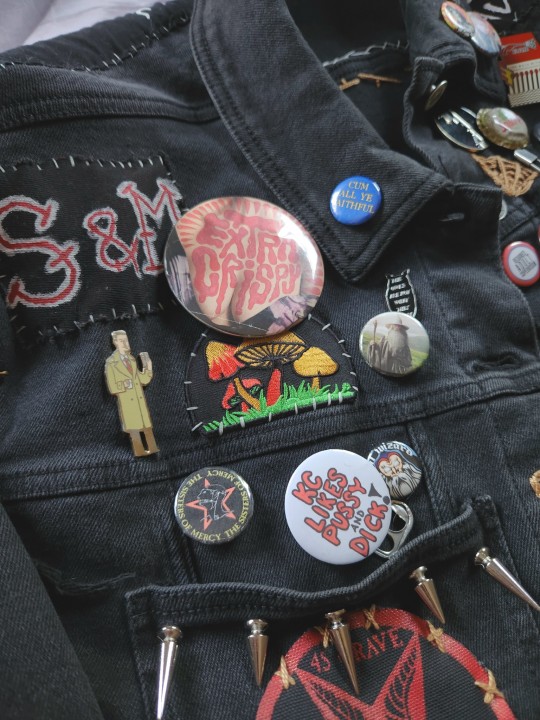


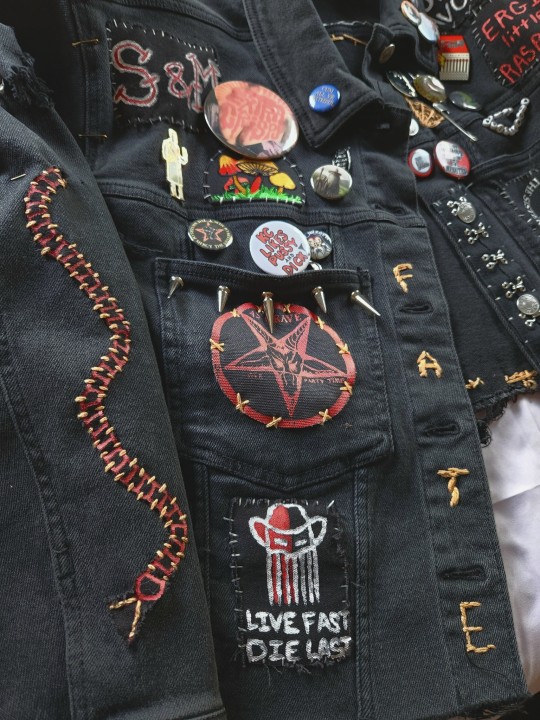

Details on my Loki/Oðinn battle jacket. Guess which side's which?
66 notes
·
View notes
Text

oðinn (derogatory)
8 notes
·
View notes
Text
May be a bit niche, but does anybody know of any articles discussing creative powers (physical/manual and intellectual) and gender in the Viking age?
I've been thinking about how the feminine norns and disir create the first laws (as told in the version of creation in the Völuspá poem) while Oðinn and his brothers supposedly are in charge of physically crafting parts of the worlds and humanity. The feminine voice and masculine hand when it comes to power I suppose, as well as when it comes to who maintains both traditional lore and legal codes in literature/literary memories vs in reality.
Wish I had included more on gender in my dissertation but alas it wasn't related closely enough to anything else I was writing about.
#norse mythology#old norse literature#viking studies#medieval studies#medievalist#I'm trying to figure out if i can build up some original enough stuff that would make applying to postgrad a bit more worthwhile#stuff to look into during a year away from academics now that ive got my first degree
12 notes
·
View notes
Text
Doing some work on my ZnT fic, and one core issue is the fact that I've given myself the task of inventing a fantasy religion's rites, rituals, and liturgy. Book 1, Chapter 5 follows Lodewijka (Louise) and her year level participating in the Day of Calling prelude service, which involves the morning prayers, followed by a reading from the relevant Saga and a sermon, topped with the Summoning Ritual preperations — an invocation of the Norse Fates, a sacrifice, and the blessing of the students.
So far, I've wrangled myself into needing to create several different liturgical prayers and blessings, up to and including:
The Ritual Purification Blessing
The Morning Prayers and Blessings
The Opening Prayers for Reading the Sagas
The Closing Prayers for Reading the Sagas
The Invocation of the Nornir (Skuld, Verðandi, and Urðr)
The Summoner's Blessing
Might even have to include an Invocation of the Ancestors and an Invocation of the Gods of Magic (primarily Brimir, but Freyja and Oðinn, too), because it is a coming of age ritual, one which every mage does, and because the ritual itself was invented by Brimir.
So far, I've not done much. I want to base it off of Roman Catholic rites, because the Church in ZnT is basically fantasy Roman Catholicism with a Nordic twist, but it's difficult figuring out what parallels I can pull between the two.
The most I got is, like, a rough draft for the Invocation of the Nornir, which goes something like this:
Blessed are the Nornir,
Blessed are the Yggdrasill-Nourishers,
Blessed are the Sisters-Three,
Hear us and bless us,
Skuld, who speaks,
Verðandi, who carves,
Urðr, who preserves,
Hear us and bless us,
We beseech you,
Bless these children,
Guide them (in this holiest day),
Hear us and bless us,
For generations and generations,
We have called on you,
Perpetuate this age old covenant,
Hear us and bless us,
By your right judgement,
Bless them with their fated companion,
Make these children whole,
Hear us and bless us,
As you bless our blood,
We gift you blood,
Accept our sacrifice,
Hear us and bless us,
So we say:
So it is.
It's a call and response. The priest (goði) leads the invocation with the students chanting the italics. I'm just not exactly pleased with the word choice for this piece of liturgy. The word choice feels iffy, though I'm not sure how to fix that. The last few stanzas are especially annoying.
The basic structure is fine, though. It's got the standard structure of a prayer — who are you invoking, why are you invoking, and what you will give in return. Plus the repetition of three is a nice touch.
4 notes
·
View notes